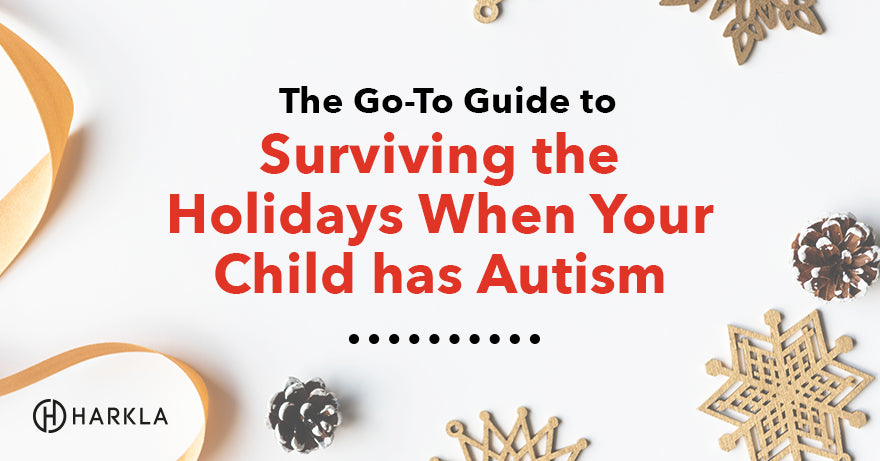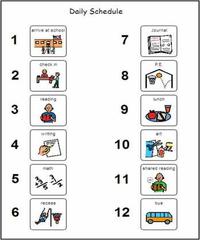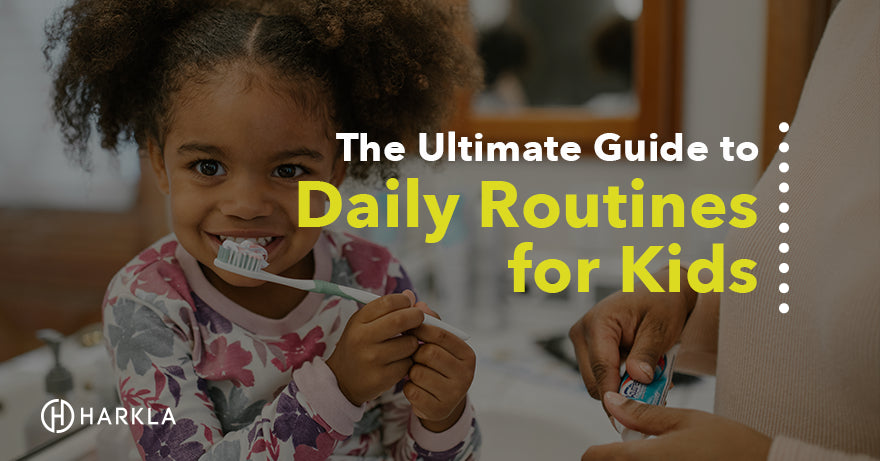Your Cart is Empty

It seems like the holiday marketing pitches start earlier every year. Lately, stores begin to deck the halls before kids celebrate Halloween!
While we all love to share the holidays’ cheer, these not-so-subtle changes in our environments and daily routines can put adults and kids alike into a holiday frenzy.
With the advent of tinsel, sleigh bells, and festive music, comes the stress of finding the just-right gift, visiting with family near and far, and negotiating bustling store crowds and holiday parties.

Holiday stress is a reality that adults can (usually) identify and cope with on our own, but kids feel the strain of the holiday craziness as well without the fine-tuned ability to self-regulate.
If your child has autism or sensory processing issues, the changes in routine, loud shopping malls, and busy holiday parties can result in sensory overload.
Hopefully, you’ve already read our article about sensory overload, so you already have some tips on-hand to help you help your child! In the event that you haven’t (yet), here are some tips to help you manage the holiday stressors and enjoy more of the festivities of the season with minimal anxiety.
Children with autism may struggle with transitions, changes in routine, and over-stimulating sensory environments. During the holidays, all of these triggers can be commonplace and require more planning and forethought to manage or avoid completely. Be sure to consider the following:
It’s always better to be over-prepared and proactive! When you know something is going to change, communicate the expectations with your child, explain the change in routine, or give a heads-up for an upcoming transition.

The way that you prepare your child will depend on his/her developmental skills and communication abilities. Social stories are common ways of communicating about these potentially stressful changes because they outline the expectations that may otherwise be anxiety-producing: where are we going, who will be there, what are we going to do, when can we leave.
Set your child up for success as much as possible and bring along any visual supports that might help him/her to request help or ask to leave a situation.
In our article about managing meltdowns, we talked about the body’s response to anxiety or stress and the “fight or flight response.” Shopping malls during the holidays are the epitome of anxiety and stress, compounded by the overwhelming sensory stimuli of noises, bright lights, crowded stores, and people in close proximity!
If shopping is unavoidable, consider bringing along a portable sensory toolbox that includes any of the following:
These sensory tools will allow you to accommodate for any noxious sensory inputs that you might encounter on your holiday shopping journey and prevent overstimulation before it happens.
You might find these same sensory tools to be effective at family parties that your child might otherwise disengage from.
Wherever you go this holiday season, be proactive in considering the additional sensory stimuli that your child might find overwhelming and plan accordingly.
It’s easy to lose track of sleep schedules during the holiday season with all of the celebrations, extended school vacations, and overnight visitors.
Kids with autism can struggle with sleep patterns and the effects of sleep schedule irregularities can have long-lasting impacts on their abilities to self-regulate during already dysregulating holiday time.
For more information on improving your child’s sleep, check out our article here, and don’t forget to consider adding a weighted blanket for some additional deep touch pressure input during the colder weather months.
When you shop for the “perfect gift” for a child with autism, you will want to consider their sensory preferences.

Our Ultimate List of Sensory Toys articles is a great place to start for using a sensory shopping mindset!
You might need to help the relatives narrow down your child’s sensory preferences, so be sure to tell them what characteristics of toys might be great to include or best to avoid:
This question will likely offer mixed answers depending on the different sensory systems and your child’s unique sensory profile.
For example, perhaps your child seeks out (loves) watching lights blink but avoids (dislikes) loud, unpredictable noises. Maybe they love water play but hate getting dirty. Love bear hugs and squishes but get anxious when they are swinging.
All of this information can inform your suggestions for gift ideas. When your loved one is out shopping for the latest “hot toy,” they’ll be better able to steer clear of the squawking noisemakers or gooey slimed toys in favor of something your child will be receptive to playing with.
Is there a favorite character, activity, or sensory experience that keeps your child engaged?
Sometimes the “hot toy” for a child with autism isn’t what another child would find exciting, but because of his specific interests, it is THE toy for him! These interests are what make the difference between an engaging toy and one that sits in the closet unused.
The purpose of gifting toys is to provide kids with hours of fun exploring, sharing, engaging, and learning new skills.
Some of the best “toys” for kids with autism are sensory tools that can be used in new ways, including therapeutically.
Take a look at your sensory spaces and what you might want to add to a wishlist for loved ones to gift. Maybe a new swing, crash mat, compression pod, or body sock would be the perfect sensory toy for your child.
The holidays are a wonderful time to reconnect with loved ones but, depending on your own family dynamics or proximities, not all extended family will be as informed about your child with autism.
Nothing adds to the stress of the holidays like conflicting expectations for managing behaviors!
Educating your loved ones about autism is the key to a successful visit.
The more they know, the better they will be able to support your parenting efforts and understand your child’s needs. Our introductory guide to Autism Spectrum Disorder is a great one to share with family to start the conversation.
The conversations about your child should happen prior to your extended family’s visit. Start a dialogue about your child’s strengths and how your family makes accommodations for any weaknesses.
Be upfront in communicating any issues with sleep or behavior, especially if your extended family will be staying in your home for overnight visits. If your child doesn’t sleep through the night, and you don’t want cranky in-laws for the holiday, you may want to offer your guests the option of staying elsewhere!
Be specific in how they can help you during their visit but also be clear in communicating that you are managing issues with the help of skilled therapists and/or teachers.
Unfortunately, family is synonymous with unsolicited advice, but these “suggestions” can be highly sensitive when the advice comes in the form of criticism on parental handling of behavioral or discipline issues. Clearly explain ahead of time what they might see for challenging behaviors but emphasize that, while they may not agree with your parenting approach, your family appreciates their support and already has the skilled expertise of professionals.
In the likely event of an awkward moment or tense situation, speak up for your family and your child. This resource from The Mighty explains how speaking your truth and being open about any feelings will ultimately lead to better relationships despite the initial discomfort of the conversation.
The holidays are stressful times for everyone but can be even more so for children with autism and sensory processing disorder. Be proactive, plan ahead as much as possible, and be mindful of the extra sensory stimulation that comes with the many festive holiday decorations, travel, and celebrations.
When you’re searching for that “perfect toy” for your child with autism, have a sensory shopping mindset and consider selecting toys that are engaging and regulating. Share these gift ideas with extended family and take this holiday season to educate your loved ones about your child’s individual needs in a way that supports your efforts as parents.
Hopefully, with sensory supports, just-right toys, and the support of friends and family, this holiday season will bring more cheer and less stress for you and your child!
Comments will be approved before showing up.



Amanda K Rogers
May 28, 2020
“Holiday stress is a reality that adults can (usually) identify and cope with on our own, but kids feel the strain of the holiday craziness as well without the fine-tuned ability to self-regulate.”
What about those of us who are adults and also have autism? Any chance you can adjust some of your language to be less child-centric?